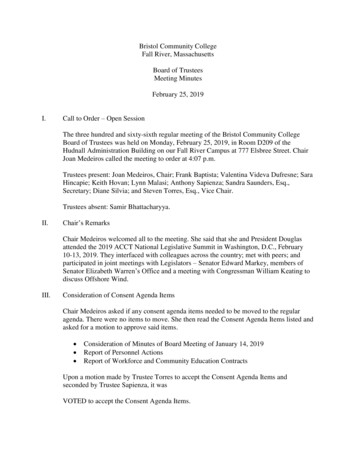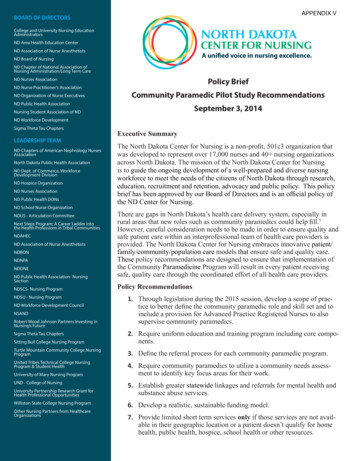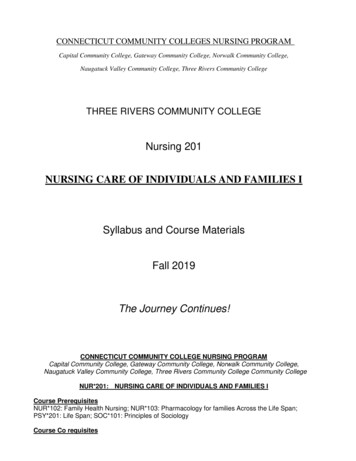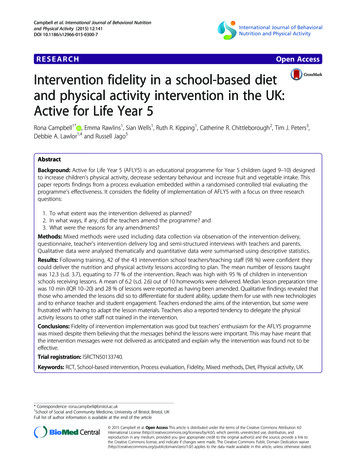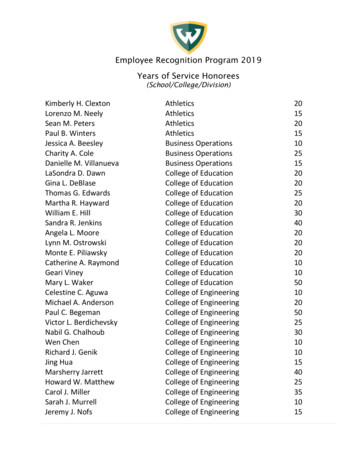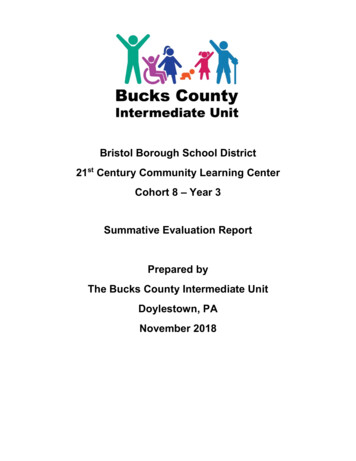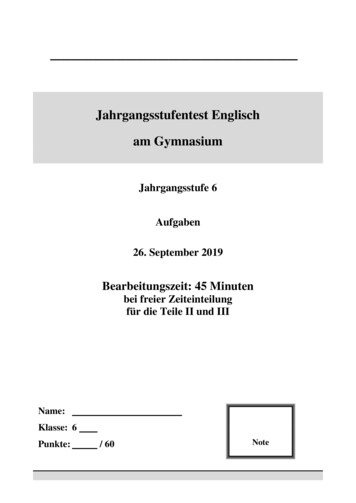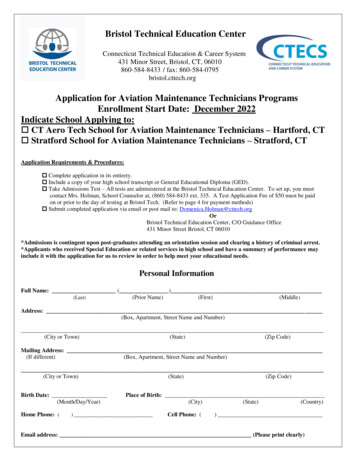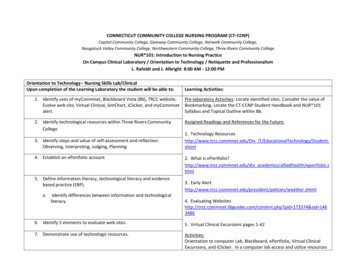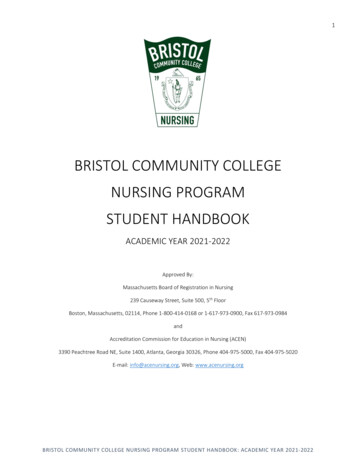
Transcription
1BRISTOL COMMUNITY COLLEGENURSING PROGRAMSTUDENT HANDBOOKACADEMIC YEAR 2021-2022Approved By:Massachusetts Board of Registration in Nursing239 Causeway Street, Suite 500, 5th FloorBoston, Massachusetts, 02114, Phone 1-800-414-0168 or 1-617-973-0900, Fax 617-973-0984andAccreditation Commission for Education in Nursing (ACEN)3390 Peachtree Road NE, Suite 1400, Atlanta, Georgia 30326, Phone 404-975-5000, Fax 404-975-5020E-mail: info@acenursing.org, Web: www.acenursing.orgBRISTOL COMMUNITY COLLEGE NURSING PROGRAM STUDENT HANDBOOK: ACADEMIC YEAR 2021-2022
iTABLE OF CONTENTSWelcome . .1The Mission of Bristol Community College . .2Bristol Community College Vision Statement . .2Bristol Community College Statement of Core Values . .2Nursing Philosophy . . .3Program Outcomes .4Curriculum .5NUR 100: Introduction to Professional Nursing .5NUR 101: Fundamentals of Nursing 5NUR 102: Parent-Child Health Nursing .6NUR 201: Nursing Care of the Adult I . 6NUR 202: Nursing Care of the Adult II 7NUR 203: Trends in Nursing .7Educational Theory: Constructivism .8Program Options .9Transfers Between Options (Traditional and eHealth) .9Ratio of Clock Hours to Credit Hours of Lecture and Clinical Experiences .9Program Metaparadigm .10End-of-Program Student Learning Outcomes .11End-of-Course Behaviors 11Evaluation Methods .12I. Assessments .12Electronic Testing Policy .12Assessment Day Rules .12Tardiness 12Assessment Make-up Policy .13BRISTOL COMMUNITY COLLEGE NURSING PROGRAM STUDENT HANDBOOK: ACADEMIC YEAR 2021-2022
iiAssessment Review Policy .13II. Student Clinical Performance .13Criteria for Satisfactory Performance 13Mandatory Behaviors 13Clinical Warning 13Self-Evaluation 14Formative and Summative Evaluation .14III. Other .14Grading 15Midterm. .15Clinical Failures 15Dismissal .15Withdrawal Policy . .15Readmission Policy .16Categories for Readmission 17Academic Integrity .18Academic Dishonesty Policy (Cheating, Plagiarism, Facilitating Academic Dishonesty) .18Faculty Role in Reporting Academic Dishonesty .19Evaluating and Reporting 19Academic Penalties .19Academic Negligence 19Due Process .19Code of Ethics for Nurses (ANA) .20Professional Conduct 21Clinical Agencies .21Student Responsibilities and Requirements Attending Clinical Agencies 21Program Requirements .22BRISTOL COMMUNITY COLLEGE NURSING PROGRAM STUDENT HANDBOOK: ACADEMIC YEAR 2021-2022
iiiAttendance .22Electronic Devices .22Intellectual Property 23Civility .23Uniform Regulations .24Requirements for Continued Enrollment .26Good Moral Character .26Criminal Offender Record Information (CORI)/Sexual Offender Registry Information (SORI) 27Health Requirements .27Professional Liability Insurance .28CPR Certification 28Drug Screening 28Functional Abilities .28Criterion: Analytical and Critical Thinking .29Criterion: Communication .29Criterion: Emotional Stability .29Criterion: Physical Ability 30Criterion: Sensory Ability 30Disability Services 31Early Alert/CARE Team 31Occupational Hazard .32Educational Pathways .33Nursing Education Transfer Compact .33Program Articulations . .34Appendices Section: Forms .35Clinical Evaluation Tool: NUR 101 .36Clinical Evaluation Tool: NUR 102 .43Clinical Evaluation Tool: NUR 201 .50Clinical Evaluation Tool: NUR 202 .57BRISTOL COMMUNITY COLLEGE NURSING PROGRAM STUDENT HANDBOOK: ACADEMIC YEAR 2021-2022
ivClinical Warning Form 65Student Withdrawal Form .67Functional Abilities Essential for Nursing Practice Attestation Form 68Report of Physical Examination . 72Incident Report Form .74Handbook Attestation Form .75Social Media Attestation Form .76Waiver of Liability Form 77Nursing Arts Laboratory Attestation Form .78Clinical Lab Formative Evaluation Tool .79References 80BRISTOL COMMUNITY COLLEGE NURSING PROGRAM STUDENT HANDBOOK: ACADEMIC YEAR 2021-2022
1WELCOMEDear Nursing Student,It is our pleasure to welcome you to the Department of Nursing at Bristol Community College and congratulateyou on your decision to pursue a career in nursing.Nursing is a career choice that is both demanding and rewarding. The nursing program at Bristol CommunityCollege is designed to provide you with the knowledge, attitude, and skills for you to be successful as aregistered nurse. You have made an excellent choice!The purpose of this handbook is to acquaint you with policies specific to the Department of Nursing. You areresponsible for all information contained within the official Bristol Community College Academic Catalog, theBristol Community College Student Handbook, and other official college publications.It is your responsibility, as a student, to become familiar with the policies of the nursing program and to complywith them, as well as all college policies. Students will be notified of any policy changes with revisions beingannounced and posted on the course and/or community pages and via college e-mail.The Department of Nursing faculty and staff wish you much success as you pursue your nursing studies.Sincerely,Bristol Community College Nursing Faculty and AdministrationBRISTOL COMMUNITY COLLEGE NURSING PROGRAM STUDENT HANDBOOK: ACADEMIC YEAR 2021-2022
2THE MISSION OF BRISTOL COMMUNITY COLLEGEMission StatementBristol Community College provides an accessible, innovative and inclusive education that prepares students tonavigate and succeed in our ever-changing world.Vision StatementAdvancing a vibrant, diverse community through education, learner by learner.Statement of Core Values Collaboration: we are dedicated to creating an atmosphere of professionalism, where all stakeholderscan share their ideas, work together and support one another in our common goal of student success.Communication: we openly and honestly share information that impacts our work, include stakeholdersin the decision-making process and ensure a collective approach to shared goals that relies on ongoingfeedback from students, faculty, staff, and community members.Inclusion: we commit to fostering a diverse college community that respectfully embraces and affirmsindividual perspectives and identities to create an environment that promotes inclusion and equity forall.Innovation: we meet the challenges of today and tomorrow by creating a culture built on creativity,ingenuity and agility, where people are empowered to continuously improve our processes andperspectives to exceed community needs and expectations.Respect: we treat each other with kindness, assume positive intent and genuinely listen to each other tocelebrate our individual differences and foster our collective strengths.Student Success: we strive to serve our students and support their growth, providing them withequitable access to all services, support and the tools necessary to achieve their personal, professionaland educational goals.BRISTOL COMMUNITY COLLEGE NURSING PROGRAM STUDENT HANDBOOK: ACADEMIC YEAR 2021-2022
3NURSING PHILOSOPHYThe nursing program at Bristol Community College provides students with an affordable education whichprepares them for careers as registered nurses. This program transforms students into associate degree nursesprepared to work and study in the global nursing community. This education also provides graduates with theopportunity to give back to their local communities which helps nurture the region’s economic health and wellbeing."Nursing is the protection, promotion, and optimization of health and abilities, prevention of illness and injury,alleviation of suffering through the diagnosis and treatment of human responses, and advocacy in the care ofindividuals, families, communities and populations,” (American Nurses Association, 2021). Persons and familiesexist as bio-psycho-social, spiritual beings in their respective communities. All persons have a number of similarbasic human needs that can be met through homeostatic interactions with family and community members.Homeostasis is a concept in which physiological and psychological dimensions are intrinsically integrated, a viewthat is compatible with the notion of humans as integrated beings. By their inherent nature, persons seek astate of homeostatic equilibrium. Health represents a state of physical and emotional equilibrium in which basicneeds are met in a way that satisfies the individual. This state of equilibrium is achieved and maintainedthrough homeostatic adaptive mechanisms. Persons exist in a changing environment in which physical,emotional and social stressors may contribute to alterations in homeostasis.The role of nursing is to support a person’s adaptive mechanisms as the person seeks to maintain or regainequilibrium. Nursing, therefore, involves the diagnosis and treatment of a person’s responses to actual orpotential health problems. Nursing is operationalized through the nursing process to assess health status,identify patient problems related to the maintenance of homeostasis, plan and implement nursinginterventions, and evaluate patient outcomes. The nursing process fosters the recognition of the social andcultural diversity of persons and families, as well as the uniqueness of needs arising from individual differences.Nursing education is a planned program of selected, organized, evidence-based nursing, utilization ofbiotechnology and guided learning experiences by which an individual becomes prepared to practice the artand science of nursing. Learning is an ongoing process that results in the integration of knowledge, attitudes,skills and critical thinking to produce constructive behavioral change in the individual. It is most productive andsatisfying when the student is encouraged to be actively involved throughout the learning process. Teachinginvolves planning, guiding, and directing activities that assist students to meet identified learning objectives.Curriculum design, teaching, and learning are most effective when structured around an organizing frameworkbased on the concept of homeostasis and the nursing process. Students’ will progress from the simple to thecomplex in learning to apply the nursing process in assisting individuals to maintain or regain homeostasis.The associate degree curriculum permits the integration of general education with nursing. This providesopportunities for the learner to develop a concept of persons as bio-psycho-social, spiritual beings as well asconcept of the inter-relatedness of self, others, and society.The Associate Degree Nurse is prepared to practice in diverse roles. These roles may include direct patient care,advocacy, leadership, management, collaboration, computer literacy, and community health. Advance nursingeducation at the Baccalaureate, Masters, and Doctorate levels is encouraged and facilitated by articulationagreements.BRISTOL COMMUNITY COLLEGE NURSING PROGRAM STUDENT HANDBOOK: ACADEMIC YEAR 2021-2022
4PROGRAM OUTCOMESThe Bristol Community College nursing program is designed to promote achievement of the following desiredgraduate outcomes: The rate for retention and graduation of students is consistent with national norms for associate degreenursing programs.Graduates attain licensure to practice as registered nurses, with a passing rate for first-time NCLEX-RNexamination takers that is equal to or greater than the state passing rate.Graduates obtain employment, within one year of graduation, as entry-level registered staff nurses instructured healthcare settings.Graduates fulfill the competencies of an associate degree nurse and the educational objectives of theprogram.Graduate affirm satisfaction with the program of learning and with their perceived degree of readinessfor the licensure examination and for entry-level positions in nursing.BRISTOL COMMUNITY COLLEGE NURSING PROGRAM STUDENT HANDBOOK: ACADEMIC YEAR 2021-2022
5CURRICULUMDue to the ongoing COVID-19 pandemic, please note that guidelines from federal, state, and collegiate agenciesmay cause changes in course delivery methods as well as laboratory, simulation, and clinical experiences.NUR 100: Introduction to Professional NursingThis course provides opportunities for students to explore a variety of factors and issues that influencecontemporary nursing practice. These include an introduction to professional nursing practice, historicalperspectives of nursing, contemporary models of nursing education and practice, health care delivery systems,and an introduction to Publication Manual of the American Psychological Association (APA) and informatics.One class hour a week. Hybrid course. Fall/Spring. Day/eHealth option.Corequisites: NUR 101 or permission of the instructor. Students must receive a 77 (C ) or better in NUR 100and NUR 101 to continue in the program.Course Objectives: The student will . . . discuss the historical evaluation of contemporary nursing.define models of nursing education and practice.identify computer and information literacy skills required by professional nurses.describe current healthcare delivery systems and the roles of nursing within these systems.explore ethical and legal issues related to nursing practice.NUR 101: Fundamentals of NursingThis course focuses on basic human needs. It emphasizes the care of persons threatened by simplehomeostatic deviances that interfere with basic human needs. Students are introduced to the nursing processas they develop basic nursing skills in the college and clinical laboratories. Day, evening, and weekend hoursare used for clinical teaching. Students must receive a C (77) or better to continue in the program. Four classhours and twelve practice hours a week in hospitals and health agencies. Fall. Day/eHealth option.Prerequisites: CSS 101, ENG 101, PSY 101, BIO 233, all with a grade of B- or betterCorequisites: NUR 100Course Objectives: The student will . . . describe the theory which serves as the basis for selecting nursing interventions to assist an adultpatient in maintaining the ability to meet basic needs and/or regain this ability when threatened bysimple homeostatic deviances.apply the nursing process in assisting the patient to maintain or regain the ability to meet basic needswhen threatened by simple homeostatic deviance.utilize accurate and clear communication to converse with clients, interact with faculty and primarynurse, and document dataprovide information to the patient by explaining the planned nursing care.summarize the roles and functions of members of the health team.practice in accordance with established legal and ethical standard.BRISTOL COMMUNITY COLLEGE NURSING PROGRAM STUDENT HANDBOOK: ACADEMIC YEAR 2021-2022
6NUR 102: Parent-Child Health NursingThis course focuses on the developmental needs of the growing family during the child bearing and childrearing phases. It emphasizes assisting the members of the growing family to maintain the ability to meet theirdevelopmental needs and/or to regain this ability when threatened by homeostatic deviances. Studentscontinue to use the nursing process and to develop basic nursing skills in the college and clinical laboratories.Day, evening, and weekend hours are used for clinical teaching. Four lecture and twelve practice hours a weekin hospitals and health agencies. Spring; Day/eHealth option.Prerequisites: NUR 101 with a grade of 77 (C ) or betterCorequisites: PSY 252, BIO 234Course Objectives: The student will . . . describe the theory which serves as the basis for selecting nursing interventions to assist patientswithin the growing family in maintaining the ability to meet developmental needs and/or regaining thisability when threatened by homeostatic deviances.apply the nursing process in assisting patients with the growing family to maintain or regain the abilityto meet developmental needs when threatened by homeostatic deviances.utilize verbal, nonverbal, and written communication in goal-focused interactions with members of thegrowing family, faculty, and agency staff.provide developmental needs information from standardized teaching guides as needed by patientswithin the growing family.interact with other health team members in addressing client problems.identify situations and policies which impact on client rights and well-being.NUR 201: Nursing Care of the Adult IThis course focuses on the nursing care of adults with common health problems. Students apply the nursingprocess by identifying client problems, selecting interventions and administering care to adults experiencinghomeostatic deviances in the areas of food, fluid, and oxygen balance; sexuality; and emotional equilibrium.Day, evening, and weekend hours are used for clinical teaching. Four lecture and fifteen practice hours perweek in hospitals and health agencies. Fall, Day/eHealth optionPrerequisites: NUR 101 and NUR 102 with a grade of 77 (C ) or better, PSY 252Corequisites: BIO 239Course Objectives: The student will . . . describe the theory which serves as the basis for selecting nursing interventions to assist adult patientsin maintaining or regarding hemostasis when threatened by common pathopsychophysiologicaldeviances associated with food, fluid, and oxygen balance; sexuality, and emotional equilibrium.apply the nursing process in assisting patients to maintain or regain homeostasis when threatened bycommon pathpsychophysiological deviances associated with food, fluid, and oxygen balance; sexualityand emotional equilibrium.utilize therapeutic interactive techniques to communicate with patients and with families, significantothers, and agency staff.provide information from standardized teaching guides as needed by an adult patient experiencingcommon pathopsychophysiological deviances of homeostasis.identify priorities of nursing care when assigned to give care to two (2) patients.evaluate own performance and utilizes resources and activities for learning.BRISTOL COMMUNITY COLLEGE NURSING PROGRAM STUDENT HANDBOOK: ACADEMIC YEAR 2021-2022
7NUR 202: Nursing Care of the Adult IIThis course continues to address the nursing care of adults with common health problems as initiated in NUR201. The focus is on nursing care of the adults with homeostatic deviances related to metabolic balance,activity, sensation, neurologic integrity, and emotional equilibrium. The course provides a variety ofcommunity-based learning experiences. Day, evening and weekend hours are used for clinical teaching. Fourlecture hours and fifteen practice hours per week in hospitals and health agencies. Spring. Day/eHealthoption.Prerequisites: NUR 201 with a grade of 77 (C ) or better, BIO 239Corequisites: NUR 203Course Objectives: The student will . . . describe the theory which serves as the basis for selecting nursing interventions to assist adult patientsin maintaining or regaining homeostasis when threatened by common pathopsychophysiologicaldeviances associated with activity, metabolic balance, sensation, neurologic integrity, emotionalequilibrium, and multiple concurrent disorders.apply the nursing process in assisting patients to maintain or regain homeostasis when threatened bycommon pathopsychophysiological deviances associated with activity, metabolic integrity, emotionalequilibrium, and multiple concurrent deviances.utilize interviewing techniques to communicate with patients and families, faculty, agency staff, andpeers.design and implement a short-range teaching plan for a client experiencing commonpathopsychophysiological deviance of homeostasis.identify priorities of nursing care for a group of patients.serve as an advocate in support of patient’s rights and well-being.NUR 203: Trends in NursingThis course provides opportunities for students to explore a variety of factors and issues which influencecontemporary nursing practice. These include application of evidence based practice, leadership,management, and delegation concepts, role transition, community practice, and continued development intothe nurse role. One lecture hour per week. Required Community Service Learning component. Spring.Day/eHealth option.Corequisites: NUR 202. Students must receive a 77 (C ) or better in both NUR 202 and NUR 203 to continue inthe program.Course Objectives: The student will . . . analyze evidenced-based practice (EBP) guidelines.apply EBP guidelines to a health promotion activity.evaluate concepts of leadership and management.apply best practice delegation models to clinical situations.select strategies to facilitate the role transition from student to registered nurse.identify resources and activities for continues development in the nursing role.BRISTOL COMMUNITY COLLEGE NURSING PROGRAM STUDENT HANDBOOK: ACADEMIC YEAR 2021-2022
8EDUCATIONAL THEORY: CONSTRUCTIVISMNursing courses are sequenced in a way that allow the student to build on previous nursing knowledge. Thefaculty use Bloom’s taxonomy to assess this progression on assessments within a nursing process framework.Knowledge questions are recollection of factual material, application questions refer to learned materials usedwithin concrete situations, and analysis questions require more critical thinking to break down the question intoits parts and make clinical nursing judgments. NUR 100: Introductionto Professional Nursing NUR 101 Fundamentalsof NursingSemester 2 NUR 201 Care of theAdult I NUR 102 Parent andChild NursingSemester 1CLINICAL COURSES:Semester 4Semester 3 NUR 202 Care of theAdult II NUR 203 Trends inNursingKNOW/COMPAPPLICATIONANALYSISFALL SEM 1NUR 10150%40%10%SPRING SEM 2NUR 10240%40%20%FALL SEM 3NUR 20130%40%30%SPRING SEM 4NUR 20215%50%35%BRISTOL COMMUNITY COLLEGE NURSING PROGRAM STUDENT HANDBOOK: ACADEMIC YEAR 2021-2022
9PROGRAM OPTIONSThe nursing program currently offers two delivery models: traditional or eHealth. The traditional option allowsstudents to attend synchronous classes for the didactic portion of the program. The second option is a hybriddelivery method which allows students to receive the didactic portion via an online, asynchronous classroom.Both options include clinical assignments at a variety of healthcare settings in Southeastern Massachusetts andRhode Island. Clinical hours may include day, evening, or weekend assignments.The program utilizes various teaching models that engage students in active learning. Teaching learningstrategies such as flipped classroom models, online practice quizzes, concept maps, simulation, service learning,discussion boards, and/or case studies are utilized in nursing courses to foster active learning (there are someexamples of active learning but are not intended to be a complete listing). Research shows active learningpromotes student success.Transfers Between Options (Traditional and eHealth)Once a student has been accepted into their choice of program delivery option, the student must remain in thatoption for the semester. After successful completion of a semester, a student may request a transfer to analternate option. Option transfers will be based upon availability and require permissions from program facultyand the nursing department chair. Student transfers between options may only occur once in their duration ofenrollment in the nursing program.Please submit transfer requests to the department chairperson via e-mail. Subject line should state: TransferOption Request. Please include your rationale for the request within the body of the e-mail. Deadlines forrequest is the date of the current course’s final assessment. Transfer requests are accepted on a first come,first serve basis, based on availability. Students currently enrolled in the program are considered first fortransfers.Ratio of Clock Hours to Credit Hours of Lecture and Clinical ExperiencesTheory/Lecture1 credit 50 minutes of didactic teaching per weekClinical/Laboratory1 credit 3 practice hours per weekStudy for Class/Clinical1 credit minimum 3 hours per credit per weekBRISTOL COMMUNITY COLLEGE NURSING PROGRAM STUDENT HANDBOOK: ACADEMIC YEAR 2021-2022
10PROGRAM METAPARADIGMA metaparadigm is a model that encompasses and describes the main concepts of a particular discipline. BristolCommunity College’s Nursing program describes these as end-of-program student learning outcomes asknowledge, attitudes, and skills to safely support client health in a changing environment.Person: interactingbio-psycho-social,spiritual beings withsimilar basic humanneedsNursing: support aperson’s adaptivemechanisms as theperson seeks tomaintain or regainequilibriumHealth: physical andemotional equilibriumin which basic needsare met in a way thatsatisfies the individualthrough adaptationEnvironment:physical, emotional,and social stressorsmay contribute toalterations inhomeostasis.BRISTOL COMMUNITY COLLEGE NURSING PROGRAM STUDENT HANDBOOK: ACADEMIC YEAR 2021-2022
11END-OF-PROGRAM STUDENT LEARNING OUTCOMES (EPSLO)1. Applies concepts and principles from nursing, the physical andbehavioral/social sciences, and from general education (humanities,math, and history) in analyzing data and making judgements in thepractice of nursing.2. Provides care to patients throughout the lifespan by applying thenursing process in assisting the patient to maintain or regainhomeostasis when threatened by common health problems.3. Utilizes verbal and nonverbal modalities to communicate with patients,families, significant others, and health team members.4. Provides patient teaching by assessing the need for information,implementing short-range teaching plans, and evaluating the patient’sresponse.5. Manages care for a group of patients in a structured setting byprioritizing care and by utilizing the skills of other health teammembers.6. Functions as a member within the disciple of nursing by practicinglegally and ethically and by selecting resources and activities forcontinued development in the nurse role.END OF COURSE BEHAVIORSThe end-of-course behaviors represent the level of progression, as expected at the completion of each clinicalcourse, toward achievement of end of program student learning outcomes and associated educationalobjectives. These behaviors are measures using the Clinical Course Evaluation Instrume
BRISTOL COMMUNITY COLLEGE NURSING PROGRAM STUDENT HANDBOOK: ACADEMIC YEAR 2021-2022 WELCOME Dear Nursing Student, It is our pleasure to welcome you to the Department of Nursing at Bristol Community College and congratulate you on your decision to pursue a career in nursing. Nursing is a career choice that is both demanding and rewarding.

